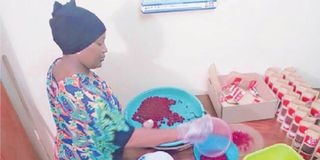Losing my job led me to a path in entrepreneurship

What you need to know:
- Today, almost five years down the line as an entrepreneur, Mwanaidi views her job loss earlier on in her career as a blessing in disguise. The retrenchment from the white-collar job was a turning point that led her towards the path to a life as an entrepreneur.
When Mwanaidi Kalinga graduated from Mzumbe University, Dar es Salaam Campus, her target was to get a white-collar job. With a Masters Degree in Business Administration and Corporate Management, the 34-year-old had strong ambitions to work in an office administrative setting, especially in financial institutions, holding senior posts that command a great deal of respect among her fellow workers. However, her ambitions did not materialize after she was retrenched from her job in the banking sector.
Today, almost five years down the line as an entrepreneur, Mwanaidi views her job loss earlier on in her career as a blessing in disguise. The retrenchment from the white-collar job was a turning point that led her towards the path to a life as an entrepreneur.
“I strongly believe that with great effort, entrepreneurship can change a life. Most successful people have created wealth through entrepreneurship. When I started, I was not sure if I would succeed making a living out of a small-scale business, but I was determined to try my luck by going for different entrepreneurial ventures, applying knowledge and skills I acquired from my education. I thank God I found my niche and I’m making good progress,” she says.
Mwanaidi sells processed baobab fruits (ubuyu) which she orders from Zanzibar. She started by ordering two to four buckets of processed baobab fruits per week. Today, after every three weeks she orders 10 buckets of baobab fruits. Each bucket produces about 70-110 packs of baobab fruits which she sells from Sh1,500 to Sh2,500 depending on the size of the pack. She thus earns over Sh1,500,000 per 10 buckets of baobab fruits.
What she does
In the baobab business Mwanaidi packages and supplies the product to supermarkets and various offices in Dar es Salaam, especially in city centre. She also supplies baobab fruits to various universities located in Dar es Salaam as most of her customers are university students.
“As the business expands, I’m planning to look for an agent to help me supply my products to different parts of the country,” says Mwanaidi, who also supplies the product to other regions in the country such as Arusha, Tanga and Dodoma.
The businesswoman says she would like to export her product, but the bureaucratic process in getting license or permit from relevant authorities such as Tanzania Food & Drugs Authority (TFDA), Small Industries Development Organization, Tanzania (SIDO), Tanzania Bureau of Standards (TBS) and others to export food stuffs has derailed her endeavor. According to her, the Diaspora population would be a potential market because the baobab fruits would make them feel right at home.
Mwanaidi says being innovative in any business is key to success. “In order to make my business more successful, I always strive to become the best expert in the business. You know it’s the packaging that sells the product in the first place, but it’s what is inside the package (the actual product) that makes the consumer come back the second time,” she says.
“For instance, in the package, I include a small paper bag for a customer to trash the baobab seeds after eating the fruits. This helps to keep the environment clean, as the customers will not litter the environment,” she adds.
Her other venture
Apart from selling baobab fruits, Mwanaidi also makes cocoa butter lotion. According to her, losing her first job became a motivating factor that made her to almost think of any business idea that would enable her earn a living.
However, it was not a smooth ride for Mwanaidi to reach where she is today. Before starting the businesses, she used to sell second-hand clothes which she supplied to various places using her own vehicle as a mobile shop.
“Do not put too much trust on people. There was a day my best friend whom I trusted betrayed me. He convinced me to team up with him and bid for a tender. We didn’t have enough money to make it. He convinced me to put my vehicle as a bond so that we can secure the deal. I agreed because I trusted him,” she recalled.
According to Mwanaidi, the friend whom she trusted double-crossed her and swindled the money they were paid after completion of the tender. “He disappeared with the money. I didn’t get a single cent from the tender payment. I was only paid back Sh500,000 after the vehicle I put as a bond was sold in order to pay the debt. That was the beginning of a rough and bumpy road towards my entrepreneurial ventures,” says Mwanaidi, who is now happy that she managed to sustain her small-scale businesses. She doesn’t feel ashamed that despite holding a Masters Degree, she is selling processed baobab fruits, as some people may think.




